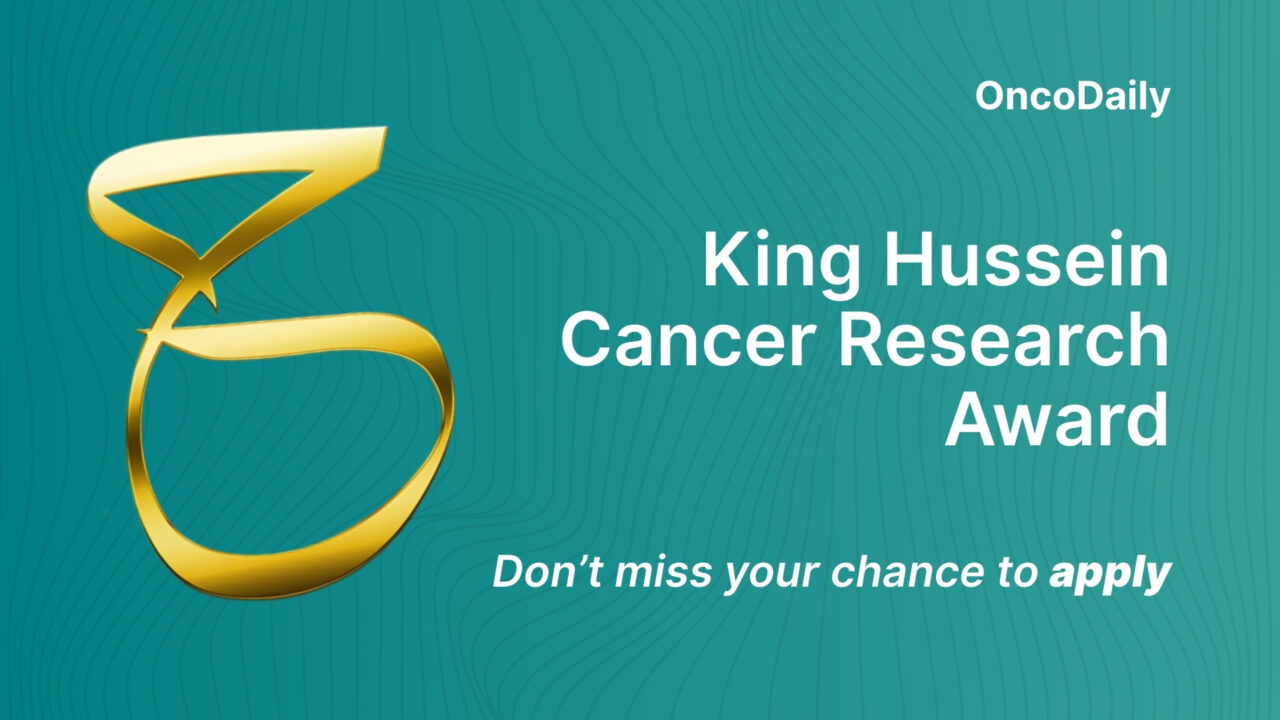
King Hussein Cancer Research Award: Don’t Miss Your Chance to Apply
Recognizing the urgent need to foster locally relevant scientific research, the King Hussein Cancer Research Award (KHCRA) was established in 2020, honoring the legacy of the late King Hussein bin Talal, a visionary leader committed to improving cancer care in Jordan and the Arab world.
The KHCRA is more than just an award—it is a beacon of hope and a catalyst for scientific excellence, designed to empower Arab researchers to lead groundbreaking cancer studies tailored to the region’s needs. At the heart of this transformative initiative is Her Royal Highness Princess Ghida Talal, Chairperson of the King Hussein Cancer Foundation (KHCF) and King Hussein Cancer Center (KHCC). Princess Ghida’s tireless leadership and advocacy have propelled KHCF and KHCC into regional and international prominence, championing comprehensive cancer care, innovative research, and public health initiatives.
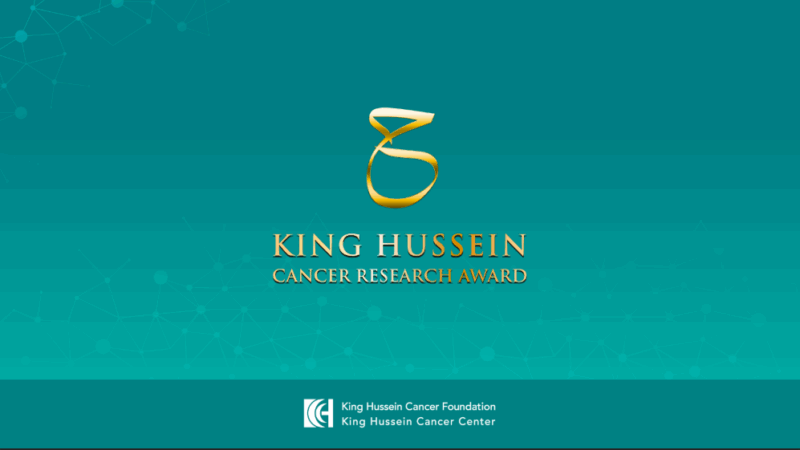
This article explores the significance of the King Hussein Cancer Award, the pivotal role of KHCF and KHCC, and the visionary contributions of HRH Princess Ghida Talal. It also highlights the award’s impact on cancer research in the Arab world and its promising future.
Who Can Apply or Be Nominated for the King Hussein Cancer Research Award?
The King Hussein Cancer Research Award (KHCRA) is designed to recognize and celebrate outstanding cancer researchers of Arab origin who have made significant contributions to cancer knowledge, prevention, diagnosis, treatment, and care. The Award encourages both established and emerging scientists working in the Arab world or abroad.
Award Categories and Eligibility
Lifetime Achievement Award: This prestigious award honors researchers who have demonstrated a lifelong commitment to cancer research and have played a pivotal role in advancing regional or international cancer science.
Eligibility
- Must hold an MD, PhD, MD/PhD, or equivalent degree.
- At least 15 years of active research experience.
- Affiliated or previously affiliated with a reputable cancer research institution.
- Demonstrated significant contributions in prevention, diagnosis, or treatment of cancer.
- Proven leadership, mentorship, and collaboration in cancer research.
Tracks:
- Regional (Arab researchers working in the Arab world)
- International (Arab researchers working outside the Arab world)
Recognition:
- USD 30,000 award
- Official Awarding Ceremony recognition
- King Hussein Award plaque
Can be nominated by eligible nominators or self-applied. Requires CVs, letters of support, publication metrics, patents (if any), and a personal statement.
Promising Researcher Grant
Supports young researchers conducting innovative cancer research projects in the Arab world.
Eligibility
- Researchers aged 45 or younger.
- Must hold an MD or PhD.
- Reside and conduct research in the Arab world.
- Research must be innovative with potential for significant impact.
Recognition:
- Grant up to USD 100,000
- Official Awarding Ceremony recognition
Young Investigator Award
Recognizes early-career investigators for impactful and innovative cancer research contributions.
Eligibility:
- Age 45 or younger.
- MD, PhD, or equivalent degree.
- Demonstrated innovative contributions to cancer research.
Tracks:
- Regional (working in the Arab world)
- International (Arab origin working abroad)
Recognition:
- USD 20,000 award
Official Awarding Ceremony recognition
Institutional Excellence Award
Honors hospitals, universities, or research institutions that have demonstrated excellence in cancer research infrastructure and collaboration.
Nomination and Application Process
Eligible nominators must submit the nominee’s CV, their own CV, and a letter of support. Self-applications require a CV and a covering letter. After initial screening, nominees/applicants submit a full application including a personal statement, external reference letters, publication records, patents, and other achievements. Applicants must declare institutional affiliation and demonstrate a strong publication history and research impact, including metrics like H-index and citation counts.
Who Can Nominate?
Individuals with a PhD or MD and at least 15 years of active research experience. Strong publication record and institutional affiliation. Not members of the Award Board or Evaluation Committee during their term or within one year after
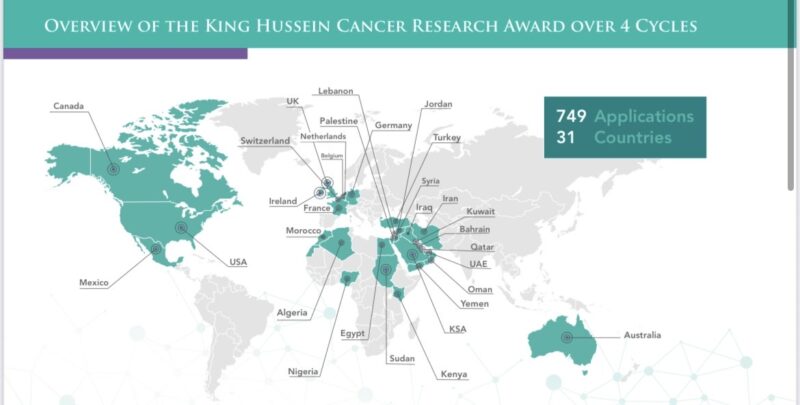
KHCC treats tens of thousands of patients annually, including many from neighboring countries, offering access to cutting-edge therapies such as CAR T-cell therapy, robotic surgery, and novel radiation techniques. The center’s commitment to research is integral, with numerous clinical trials and translational studies aimed at improving patient outcomes.
What Inspired the Creation of the King Hussein Cancer Research Award?
The King Hussein Cancer Research Award was launched in 2020 as a tribute to King Hussein bin Talal’s enduring commitment to cancer control and care. King Hussein’s legacy is deeply intertwined with Jordan’s progress in oncology, having championed the establishment of the King Hussein Cancer Center in 1997. The award was conceived to honor his vision by fostering a culture of scientific excellence and innovation among Arab researchers.
The award addresses a critical gap in cancer research: historically, much of the scientific literature and clinical guidelines have been based on studies conducted outside the Arab world, often neglecting the region’s unique genetic profiles, environmental exposures, and healthcare contexts. The KHCRA aims to empower Arab scientists to generate knowledge that directly benefits their communities, reducing dependence on external data and enhancing regional self-reliance.
How Are Winners Selected for the King Hussein Cancer Research Award?
The KHCRA’s nomination process is rigorous and highly competitive. For example, the 2024 cycle attracted 472 researchers from over 20 countries, reflecting the award’s growing prestige and international reach. Nominations undergo thorough evaluation by a distinguished panel of regional and international oncology experts, who assess scientific merit, innovation, relevance to the Arab world, and potential impact.
Awardees receive a monetary prize, a commemorative plaque, and public recognition during an official ceremony attended by dignitaries, government officials, and leaders in cancer research. The award ceremony serves not only as a celebration but also as a platform for networking, knowledge exchange, and fostering collaborations.
How Does the King Hussein Cancer Foundation Support Cancer Research Through Funding?
The King Hussein Cancer Foundation (KHCF) was established to support KHCC’s mission by mobilizing resources, raising public awareness, and funding cancer control programs. KHCF plays a critical role in expanding access to care, supporting patient assistance programs, and financing research initiatives. Together, KHCF and KHCC form a synergistic partnership that advances cancer control in Jordan and the broader Arab region. Their integrated approach ensures that research findings translate into improved clinical practice and public health strategies.

Research Integration and Regional Impact
Research at KHCC is closely aligned with the KHCRA’s mission. By fostering local scientific inquiry, KHCC generates data relevant to the Arab world’s cancer burden, including studies on genetic mutations prevalent in Arab populations, environmental risk factors, and culturally appropriate prevention strategies. This research has led to innovations in diagnostics, personalized therapies, and public health interventions, directly improving cancer outcomes. KHCC’s role as a regional hub for oncology research and care amplifies the award’s impact by providing infrastructure, expertise, and mentorship to emerging scientists.
Celebrating Impact: Notable Recipients of the King Hussein Cancer Award
The KHCRA ceremonies are high-profile events that celebrate scientific excellence and foster collaboration. The 2023 and 2024 award ceremonies, held under Princess Ghida’s patronage, brought together researchers, policymakers, and dignitaries. These ceremonies not only honor individual achievements but also serve as platforms for knowledge exchange and regional networking.
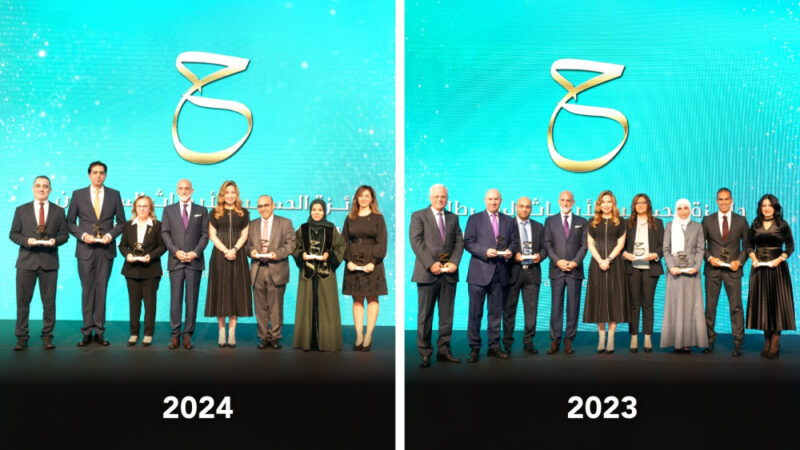
Deputizing for His Majesty King Abdullah II, HRH Prince Talal Honors 2023 and 2024 King Hussein Cancer Research Award Recipients
Among the distinguished recipients are:
- Prof. Mohamad Mohty: A pioneer in hematology and bone marrow transplantation, whose work has advanced treatment options for blood cancers.
- Prof. Randah Hamadeh: A leader in cancer epidemiology and public health, contributing to cancer control policies.
- Dr. Bishoy Faltas: Recognized for innovative genomic research in bladder cancer.
- Dr. Ola Sabet: Celebrated for her contributions to breast cancer research and treatment.
These awardees represent diverse countries and specialties, reflecting the award’s broad impact.
Ceremonies often feature speeches highlighting the importance of regional research and the collective fight against cancer. Princess Ghida’s remarks inspire perseverance and innovation, reinforcing the award’s prestige.
You Can Also Watch Our Linkdin Post About Award
Impact on Regional Cancer Research and Future Outlook
The KHCRA has catalyzed a cultural shift in Arab cancer research, encouraging scientists to pursue high-impact projects tailored to regional needs. It has inspired young researchers and facilitated collaborations across institutions and countries. Award-supported research has led to improved diagnostics, personalized therapies, and public health interventions. These advances address knowledge gaps about cancer epidemiology, genetics, and treatment responses in Arab populations. Looking ahead, Princess Ghida envisions expanding the award’s scope, enhancing research infrastructure, and strengthening international partnerships. The goal is a cancer-free Arab world achieved through innovation, collaboration, and equitable care.
The King Hussein Cancer Research Award embodies hope, excellence, and regional solidarity in the fight against cancer. Under HRH Princess Ghida Talal’s visionary leadership, KHCF and KHCC have transformed cancer care and research in Jordan and the Arab world. The award not only honors scientific achievements but also inspires a collective determination to conquer cancer. Sustained support from governments, institutions, and the public is essential to maintain this momentum and realize the shared dream of a cancer-free future.
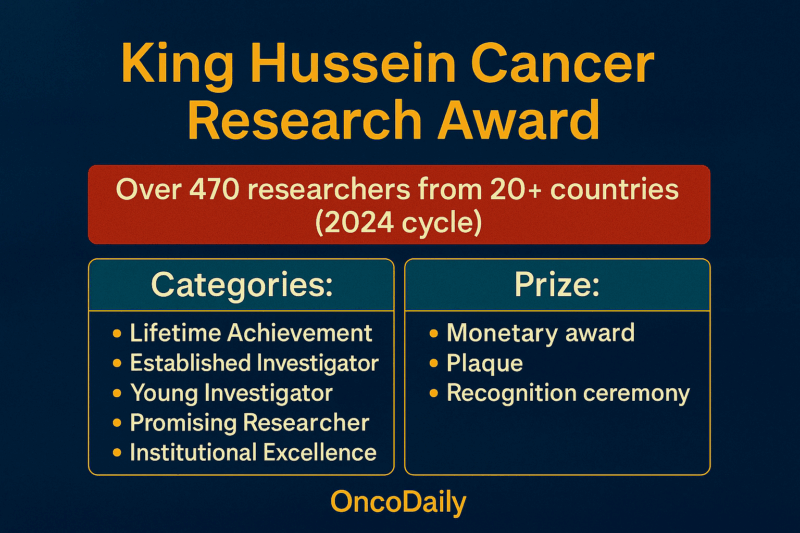
For More Information You Can Visite The King Hussein Cancer Research Award Website
Written by Aharon Tsaturyan MD
FAQ
What is the King Hussein Cancer Research Award and why was it established?
The King Hussein Cancer Research Award (KHCRA) was established in 2020 to honor the legacy of the late King Hussein bin Talal. Its purpose is to promote scientific excellence and innovation in cancer research across the Arab world, empowering Arab researchers to address the region’s unique cancer challenges.
What are the categories and criteria for the King Hussein Cancer Research Award?
The KHCRA recognizes achievements in several categories: Lifetime Achievement, Established Investigator, Young Investigator, Promising Researcher, and Institutional Excellence. Nominees are evaluated on scientific merit, innovation, relevance to the Arab world, and their potential impact on cancer care and research.
How are winners selected for the King Hussein Cancer Research Award?
Winners are chosen through a competitive nomination process that attracts hundreds of applicants from over 20 countries. A panel of regional and international oncology experts reviews nominations based on research quality, originality, and regional relevance. Winners receive a monetary prize, a plaque, and are honored at a prestigious ceremony.
What role do the King Hussein Cancer Foundation (KHCF) and King Hussein Cancer Center (KHCC) play in cancer research?
KHCF and KHCC are leading institutions in the Middle East for cancer care, research, and public health initiatives. KHCF mobilizes resources and funds research, while KHCC provides state-of-the-art treatment and conducts clinical and translational studies. Their work supports the mission of the KHCRA to improve cancer outcomes in the region.
Who is Princess Ghida Talal and what are her contributions to cancer research in the Arab world?
Princess Ghida Talal is the Chairperson of the King Hussein Cancer Foundation and Center. Since 2001, she has been a champion for cancer care, research, and advocacy in Jordan and the Arab region. Her leadership has transformed KHCC into a world-class institution and inspired the creation of the KHCRA to empower Arab scientists and drive innovation in oncology.
Who is Princess Ghida Talal and what is her background?
Princess Ghida Talal, born Ghida Salaam in Beirut, Lebanon, is the Chairperson of the King Hussein Cancer Foundation and Center (KHCF/KHCC) in Jordan. She graduated magna cum laude from Georgetown University’s School of Foreign Service and worked in journalism before marrying Prince Talal bin Muhammad of Jordan in 1991. She was appointed Chairperson of KHCF/KHCC in 2001 and has since been a leading advocate in cancer care and research in the Arab world.
What are Princess Ghida Talal’s contributions to cancer care and research?
Princess Ghida has transformed KHCF and KHCC into internationally accredited institutions providing advanced cancer care to thousands of patients. She established the King Hussein Cancer Research Award in 2020 to promote Arab-led cancer research. She has also led awareness campaigns and forged partnerships with global cancer centers to improve treatment and prevention in Jordan and the region.
What leadership roles and humanitarian work has Princess Ghida Talal undertaken?
Besides chairing KHCF/KHCC, Princess Ghida served as Press Secretary to the late King Hussein, represented Jordan at the UN General Assembly’s High-Level Meeting on Non-Communicable Diseases, and played a key role in the Iraq Scholar Rescue Project. She has been recognized with humanitarian awards for her international cooperation efforts.
How has Princess Ghida Talal impacted cancer awareness and patient care in Jordan?
Under her leadership, KHCC expanded comprehensive cancer services, including prevention, early detection, treatment, and palliative care. She also inaugurated patient-centered initiatives like the Healing Garden at KHCC to support emotional and spiritual wellbeing during treatment.
Who is Princess Ghida Talal married to and what is her family background?
Princess Ghida is married to HRH Prince Talal bin Muhammad of Jordan, nephew of the late King Hussein bin Talal and first cousin of King Abdullah II. She comes from a politically prominent Lebanese family and lives in Jordan with her husband and three children
-
Challenging the Status Quo in Colorectal Cancer 2024
December 6-8, 2024
-
ESMO 2024 Congress
September 13-17, 2024
-
ASCO Annual Meeting
May 30 - June 4, 2024
-
Yvonne Award 2024
May 31, 2024
-
OncoThon 2024, Online
Feb. 15, 2024
-
Global Summit on War & Cancer 2023, Online
Dec. 14-16, 2023
